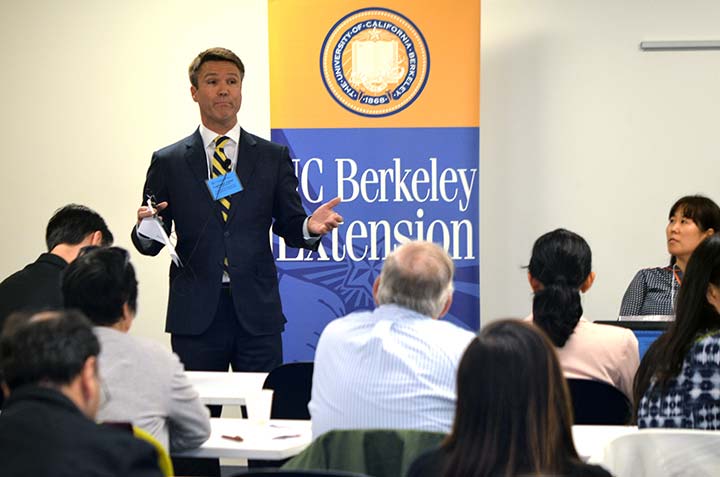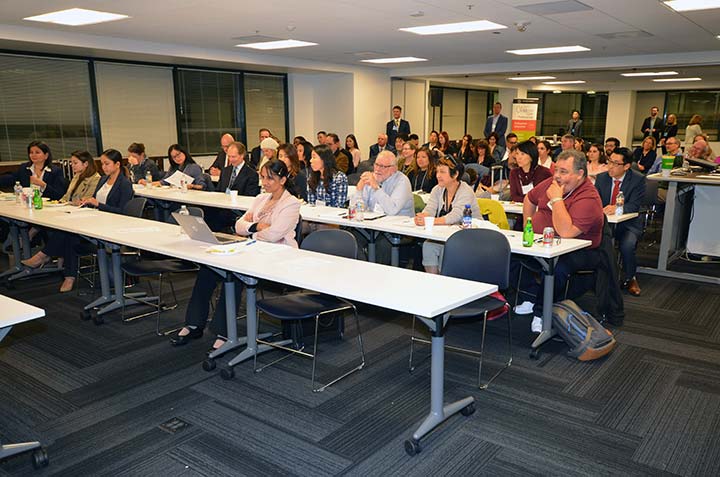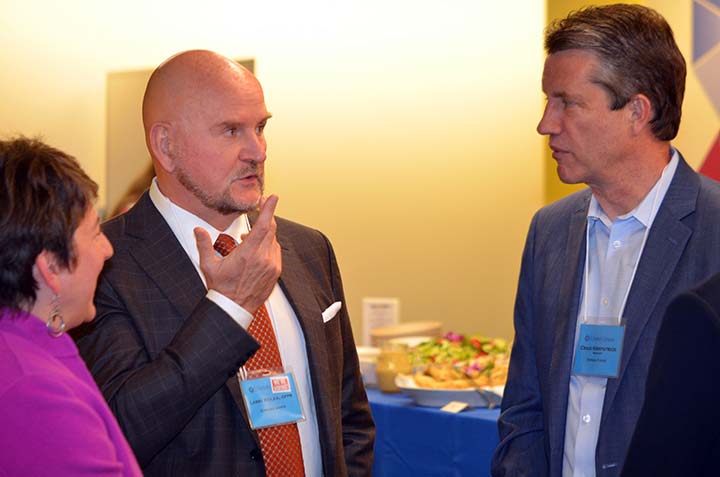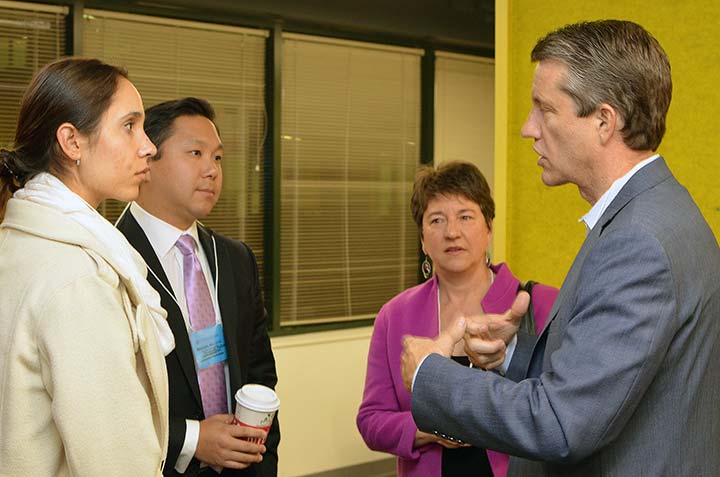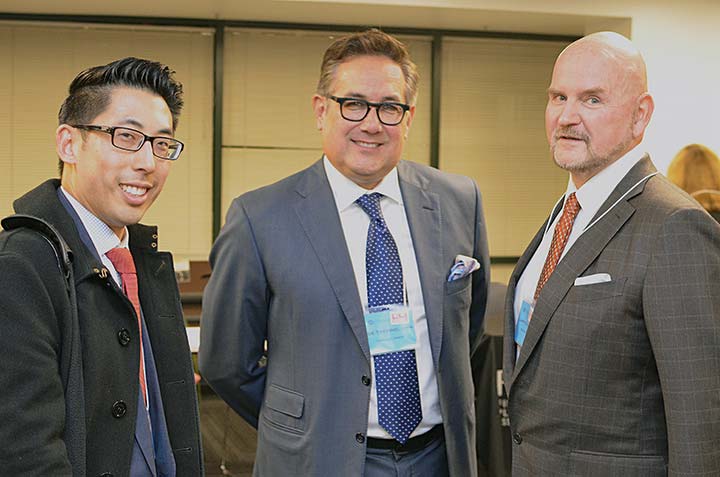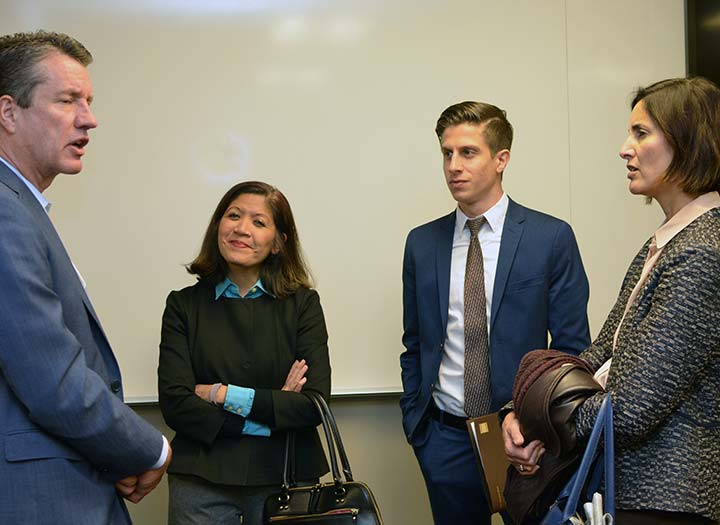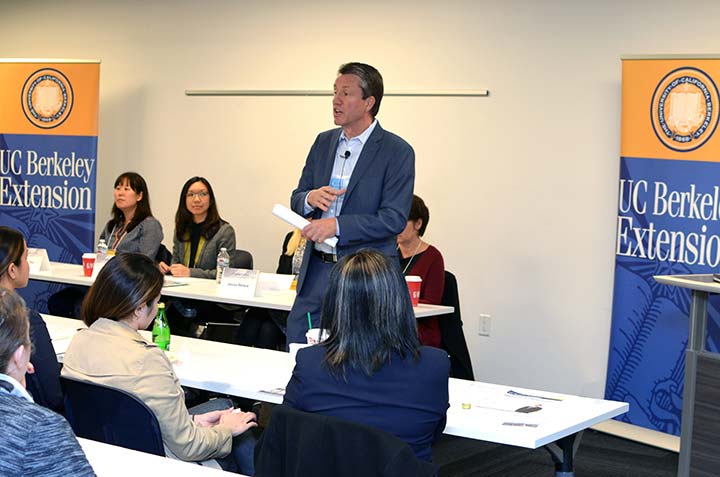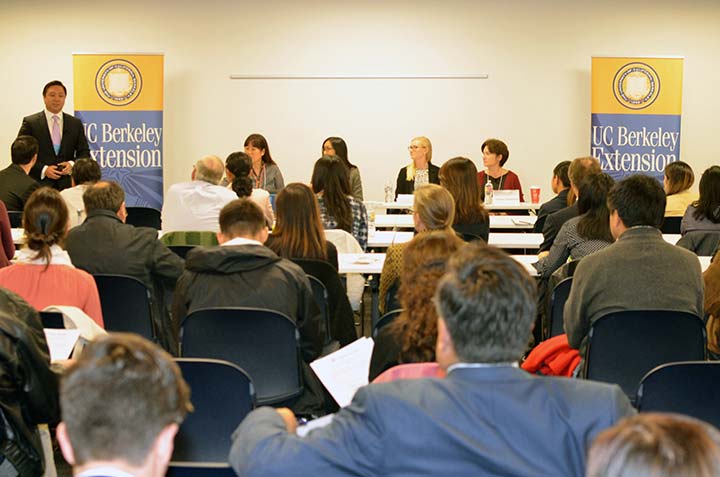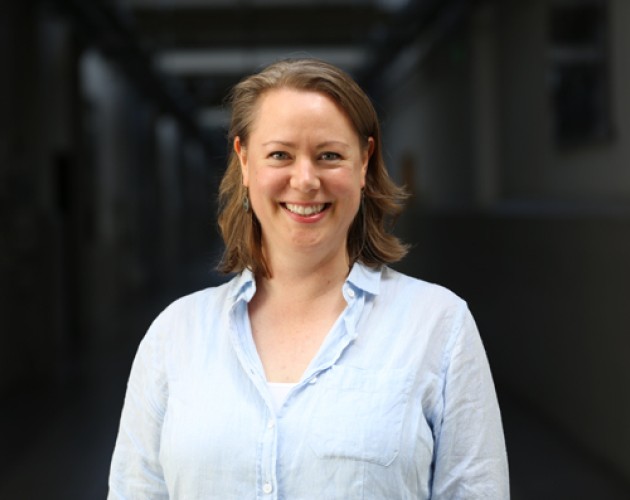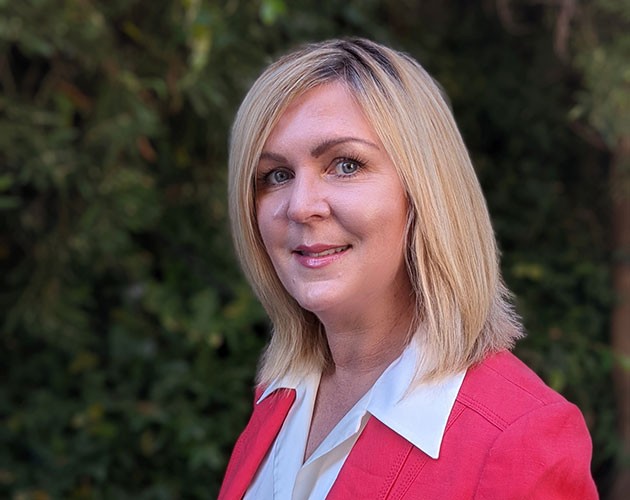Event Recap: 2017 Personal Financial Planning Career Night
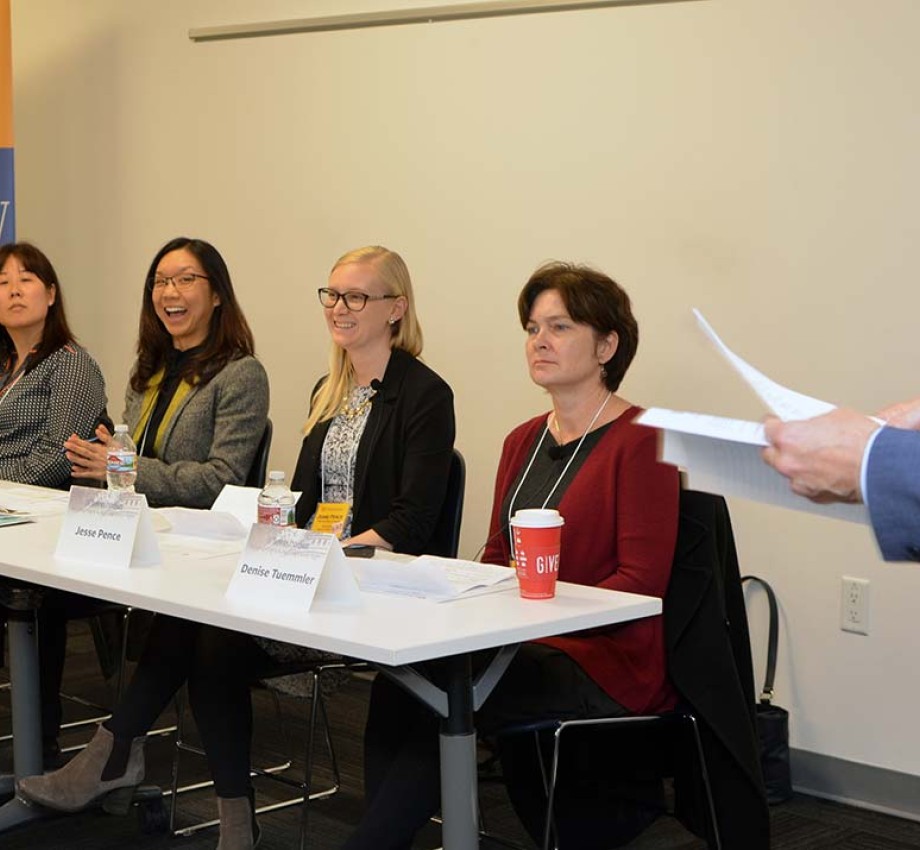
On Nov. 30, 2017, current students and those interested in our Certificate Program in Personal Financial Planning came to our San Francisco campus to hear how four women made their way to excelling in the personal financial planning field.
After the panelists' rousing conversation, members of the audience asked their own insightful questions and then networked with members of the Bay Area professional planning community, many of whom were representing firms looking to hire.
Here's a recap of the interesting panel discussions.
The Panelists
Eric Flett, Moderator
CEO and Principal at Concentric Wealth Management
Certificate Advisory Board Member
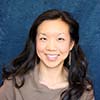
Judy Ho, M.B.A.
Financial Advisor at Edward Jones
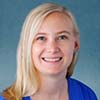
Jesse Pence
Associate Wealth Manager at Waypoint Wealth Partners
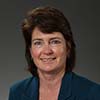
Denise Tuemmler, M.B.A., CFP
Investment Advisor at Protected Investors of America
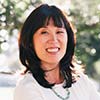
Jane Yoo, M.B.A., CFP
Founder and CEO of Jane Financial, LLC
How did you come to the PFP certificate?
Jesse Pence: I was an economics graduate from Claremont McKenna College and graduated in 2014. Right out of college, I wanted to do something in finance, but finance is such a broad world that I didn’t know where to start or where I wanted to end up.
So I initially took a job at Gilead Sciences in their financial department, doing biotech financial planning and analysis. I was there for two years and grew tired of the repetitiveness of the work. I was looking for a change, but not sure which direction to go into.
I heard about personal financial planning from an NPR radio announcement, so I read about the field, talked to different advisors in the Bay Area to get a sense of what the industry looked like, and ended up making the career change. My first interaction was here at Career Night two years ago and I've been doing this ever since!
I completed the program in August 2017, and I just passed the CFP Exam on November 10. I’m working at Waypoint Wealth Partners, and we are an independent registered investment advisor (RIA) in San Francisco. I just got promoted to Associate Wealth Manager, so I work in one-on-one teams with different lead advisors and do most of the heavy-lifting of the planning: working with our CRM to financial modeling to interacting with clients and preparing for meetings.
This was the first Career Night for 84% of attendees.
Judy Ho: I’m a child of Chinese immigrant parents, and it wasn’t until college that I got my first credit card in exchange for a bag of M&Ms. I saw a bunch of other students doing this, and I thought something was wrong with this situation. And so I studied economics at UC Davis in my undergrad.
After I graduated, I went to interview with some local financial advisors and realized I wasn’t going to succeed at age 24. So I worked as a tax preparer at H&R Block for a couple of seasons, and then worked at Franklin Templeton Investments as a fund accountant. I realized that I liked working with people better than with spreadsheets.
In 2007, I moved to San Francisco and worked at PG&E as a senior business analyst, which was great, but I wanted to get back into financial services. So I got my M.B.A. at San Francisco State University, and thought, “Now what?” That’s when I found the Extension certificate. I started by taking the Behavioral Finance class and then the Taxation class—one class led to another and to another and the next thing I knew I was done with the program in 2015. So I took the CPA exam in 2015. When I passed, I started interviewing with firms and ended up with Edward Jones as a financial advisor.
Jane Yoo: I am from Chicago—I was ecstatic when the Cubs won last year! I did my undergrad at Bryn Mawr College, majoring in chemistry. Although I had a longtime interest in personal finance, I didn’t know how to make it into a career. I had a series of jobs that didn’t interest me. So I went back to school and got my M.B.A. at the University of Chicago in 2009.
Vanguard, a premiere mutual fund company, was hiring recent M.B.A. graduates, so I moved back to Philadelphia and rotated through different departments at the company, including investment management exposure. My Vanguard experience was so fortuitous because that’s where I learned about the CFP and a certain type of financial adviser called an RIA.
In 2012, I moved to the Bay Area without a job. My contacts at Vanguard advised me that the best way to find a job was to join the Financial Planning Association and study for the CFP Exam. That’s how I came to this program. I wanted the classroom experience and to network with classmates.
I also finished the program in 2015, shortly before Judy so we are classmates.
Most recently, I was at a huge RIA called Aspiriant. Tim Kochis, who is one of the members of the certificate’s advisory board, is one of the founders of that firm. I left Aspiriant in March of this year to take another leap of faith and start my own firm, Jane Financial.
60% of attendees are looking to find a career in financial services.
Denise Tuemmler: I graduated in 2003 and was also a career changer.
I was a consultant in document management at Atdoc LLC, managing very large projects. I loved the people, but I got tired asking them about their documents. So I went back to school to get an M.B.A. in international business from Thunderbird School of Global Management. And then I got pregnant and thought I wouldn’t be traveling much overseas.
But I loved my finance classes and wondered how I could move them toward something domestic. I had moved back to California and found this certificate program and did a couple of consulting jobs to support myself.
While taking the courses, I did an internship at Protected Investors of America; I was interested in environmental, social and governance (ESG) at that point. And then I got a full-time job at Protected Investors. And then I moved over to Charles Schwab as an investment advisor for a year. I realized a large corporation didn’t work for me while I still had little kids, so I went back to the independent route and got a job with Lafayette Square Financial Advisors as a 401k account manager. I got a really good education during that time doing customer support for 401k plans.
And then one of my contacts at Protected Investors called me up and said one of the partners was retiring and would I be interested in coming back with the idea of getting to be a partner one day. I jumped at that chance, and I’ve been there since 2009.
72% of attendees came to Career Night to gain a fuller understanding of the types of financial planning careers available.
What is the thing you learned in the certificate that you use all the time? What do you need to learn after you leave?
Denise: I use something from each of the classes every day: taxation, insurance, real estate and estate planning. I loved the real estate investment class because people will always think that their home is their investment, but I have lots of discussions with clients about how you really look at real estate investment.
What I liked was that all of the instructors were experts in their fields, so I started to understand what they felt was important out in the field. It made me understand each area a little more in-depth in terms of priorities, as opposed to if I had just studied it on my own.
What I had to add is the day-in and day-out with clients and communicating complicated ideas to them in a way that they would understand. We learn a lot of terminology that our clients don’t understand, and you need to be able to explain that so your clients will understand and motivate them to make a change.
What was your plan for passing the CFP Exam?
Jesse: My classmates and I knew we had about two-and-a-half months to study for the exam. So in the capstone class, a couple of classmates and I—about 7 of us total—decided to study together. We would get through all of the material, all of the questions and then we would meet once a week and go through our list of questions of things we wanted to talk about, things we didn’t understand.
It kept us accountable to the plan and to each other and it made it much more enjoyable, because at least once a week you have this group of people who are going through the same level of intense studying. We had a really great success rate in passing the exam!
Did you have a mentor or tap into other resources?
Judy: I have so many mentors. It’s good to find people who have been in the industry for a while and just pick their brains to learn more and help you get a footing in the direction that you want to go.
Once you’ve decided on that path and you’re in the field, that’s when you start finding new mentors. Try and have three levels: the first is someone who is starting off with you. And then another group that has peer mentors. And then the third is with situated professionals.
Go for the people you’re drawn to, who have shown success, who can share their best practices because they’re going to be the ones who will help you gain the confidence and skill sets you need to grow your own business. Don’t wait for them to come; feel free to go after them.
Jane: The Financial Planning Association is a great community. When I first moved here, I was completely new to the profession and it was great to see how welcoming everyone was. It’s the mentality of collegiality; it’s not about competition. So go to the chapter meetings, volunteer for one of the committees. Check out the Emerging Advisors Program, which is geared toward career changers aged 36 and under.
Jesse: My strategy coming to the profession was to talk to as many people as I could. When I was learning about the world of financial planning, I didn’t know anybody in the field. So I went to the Financial Planning Association’s website and pulled the first 30 people who came up in a Bay Area search. I sent every single one of them an email asking, “Will you take the time—either a phone call or grabbing coffee—and tell me about what you do, how your business works, what you think I should be doing.”
Of the 30, maybe five ended up responding, and they were really great conversations. Each one was really different, and by the end of it I had a really good sense for the lay of the land of financial planning, the difference between a brokerage and an RIA, and what people who are working in each of those types of models think of it.
Check out the event photo gallery below!
